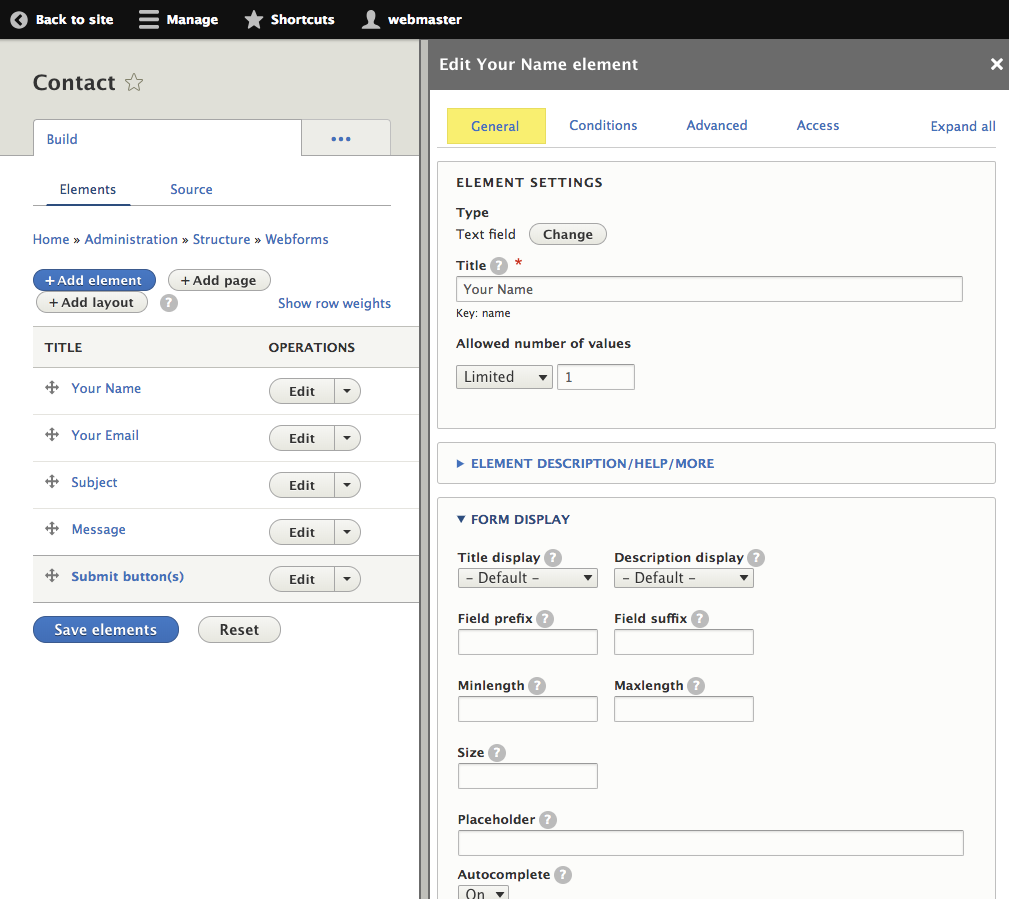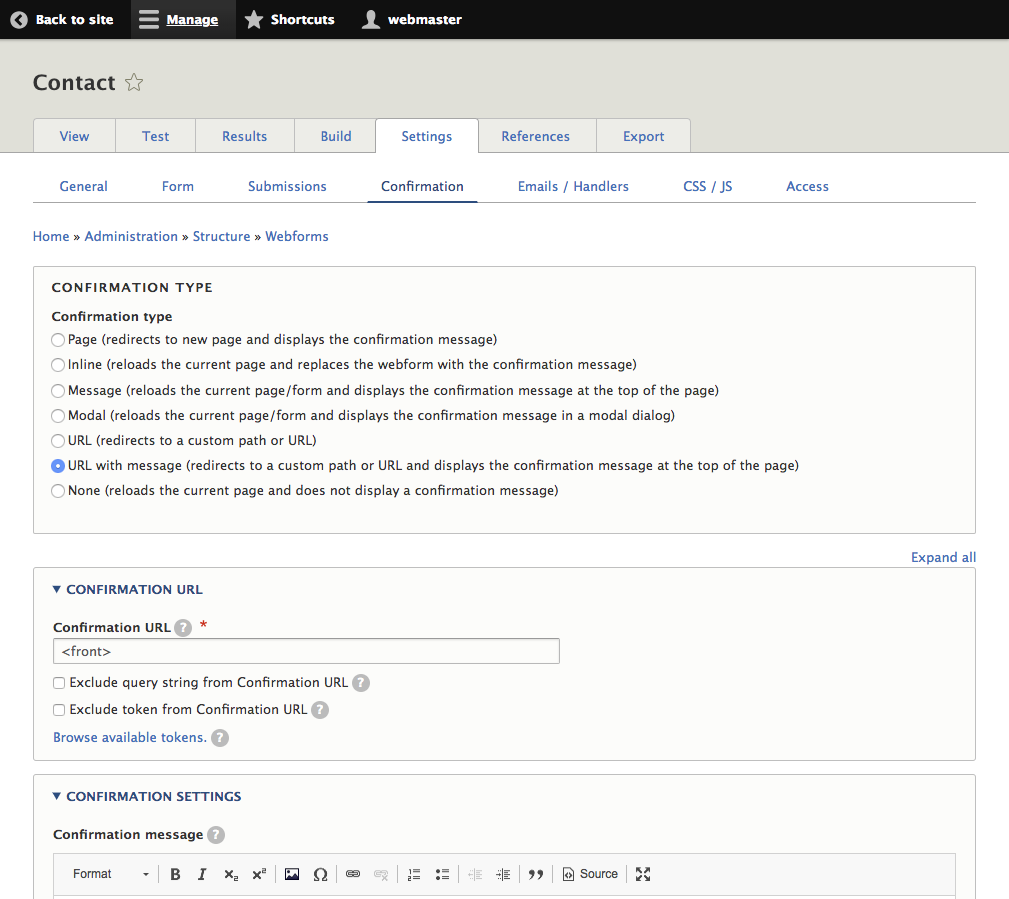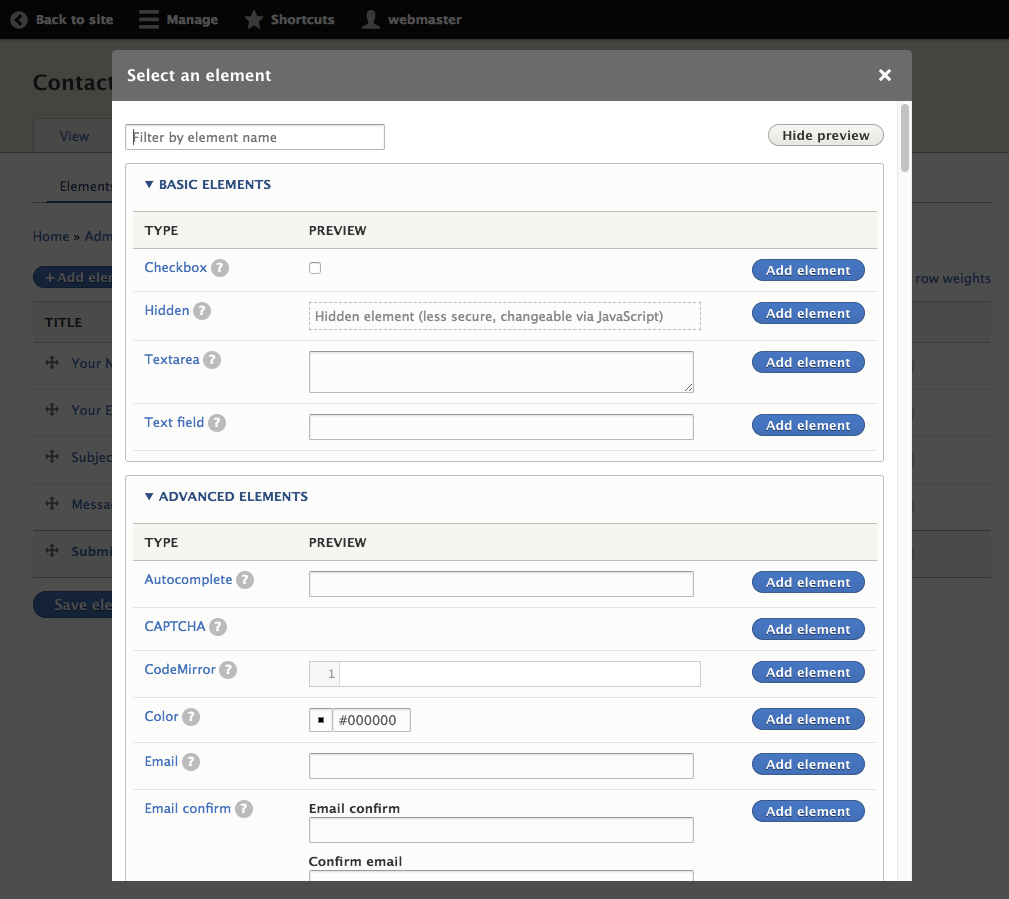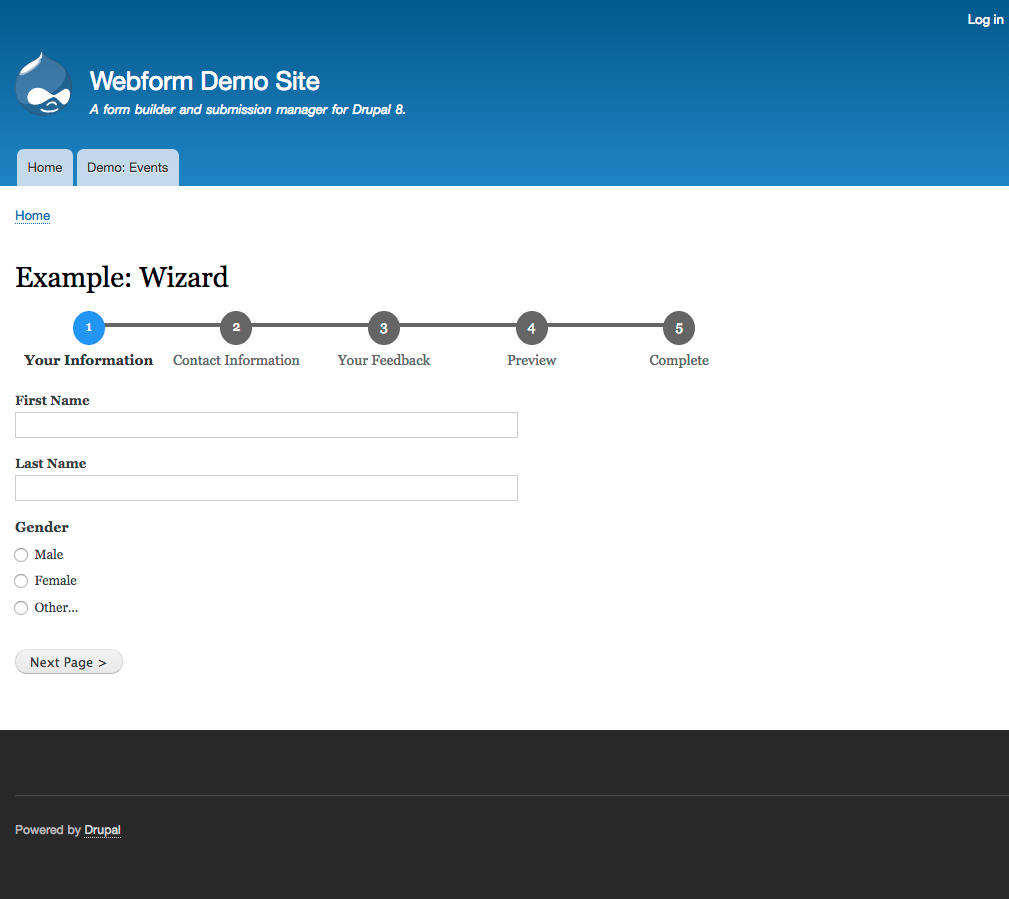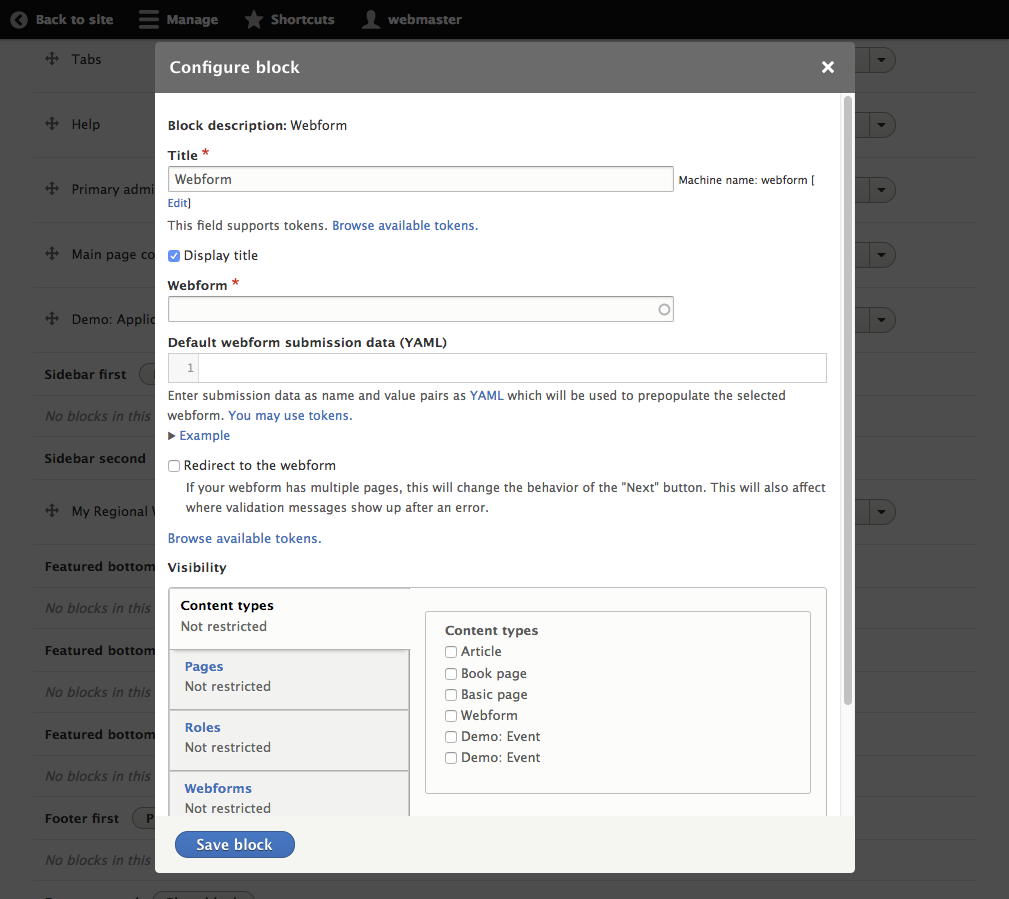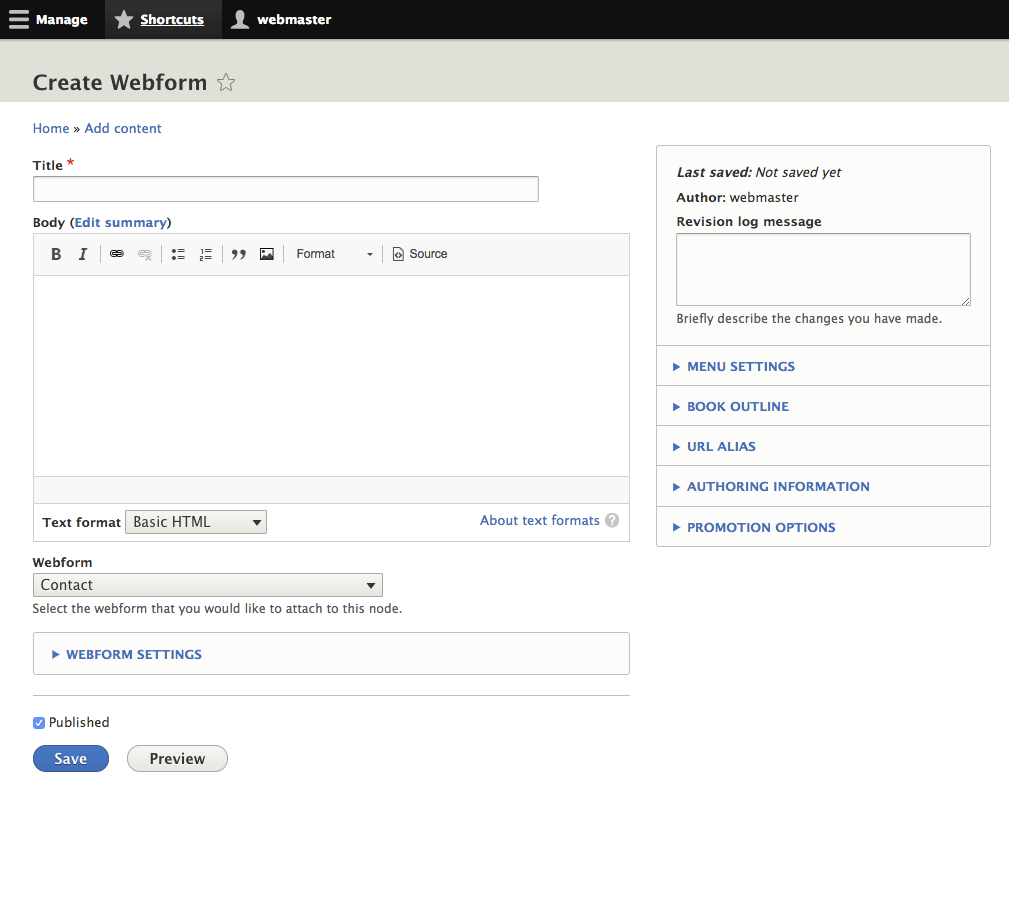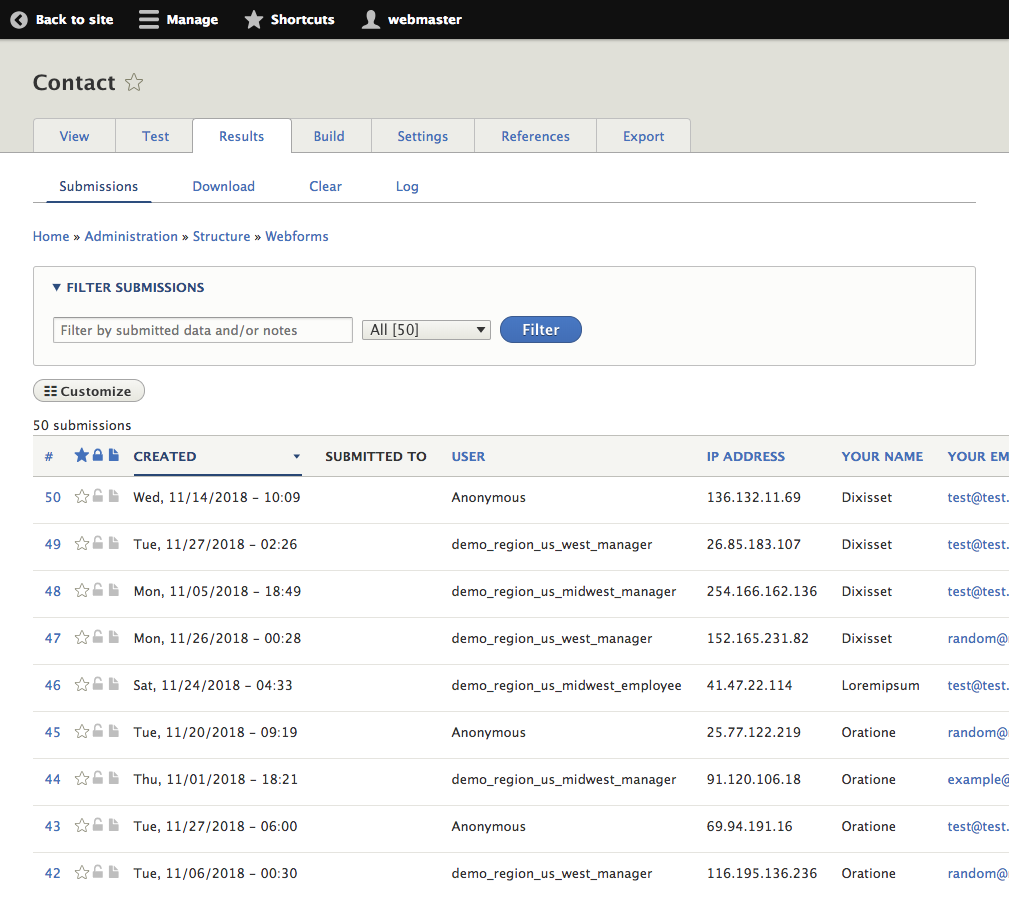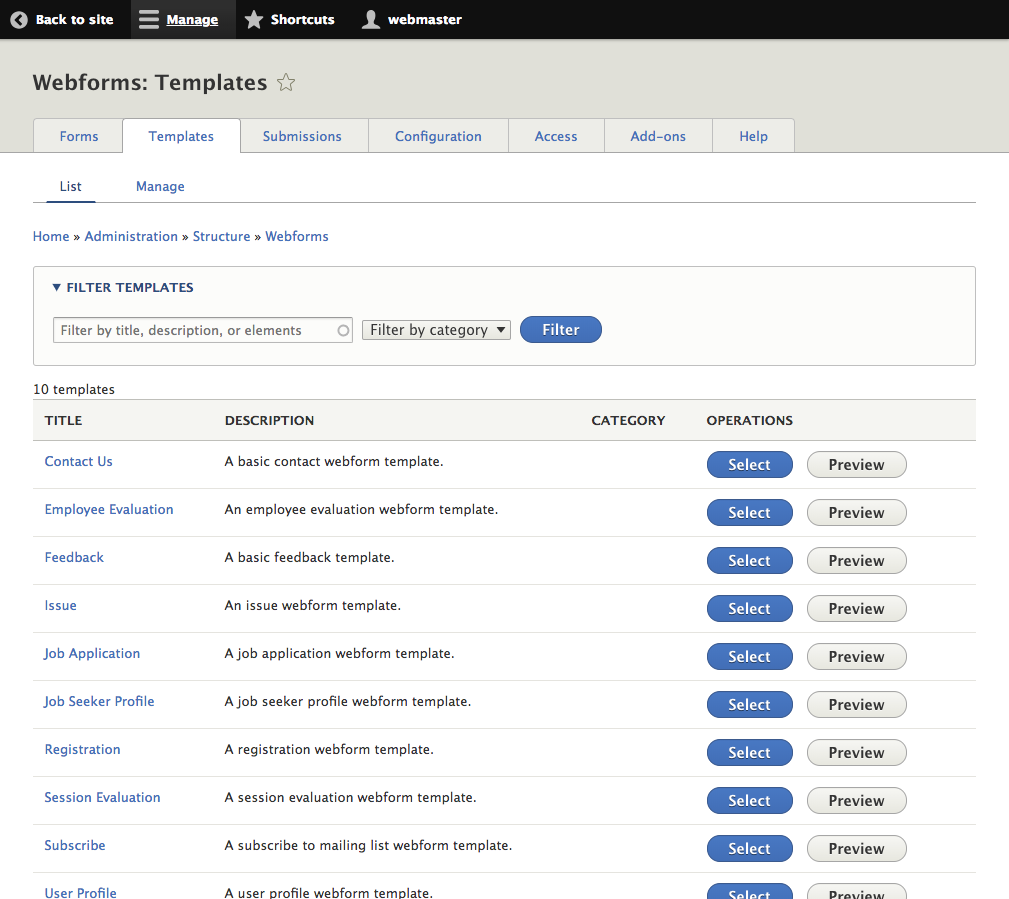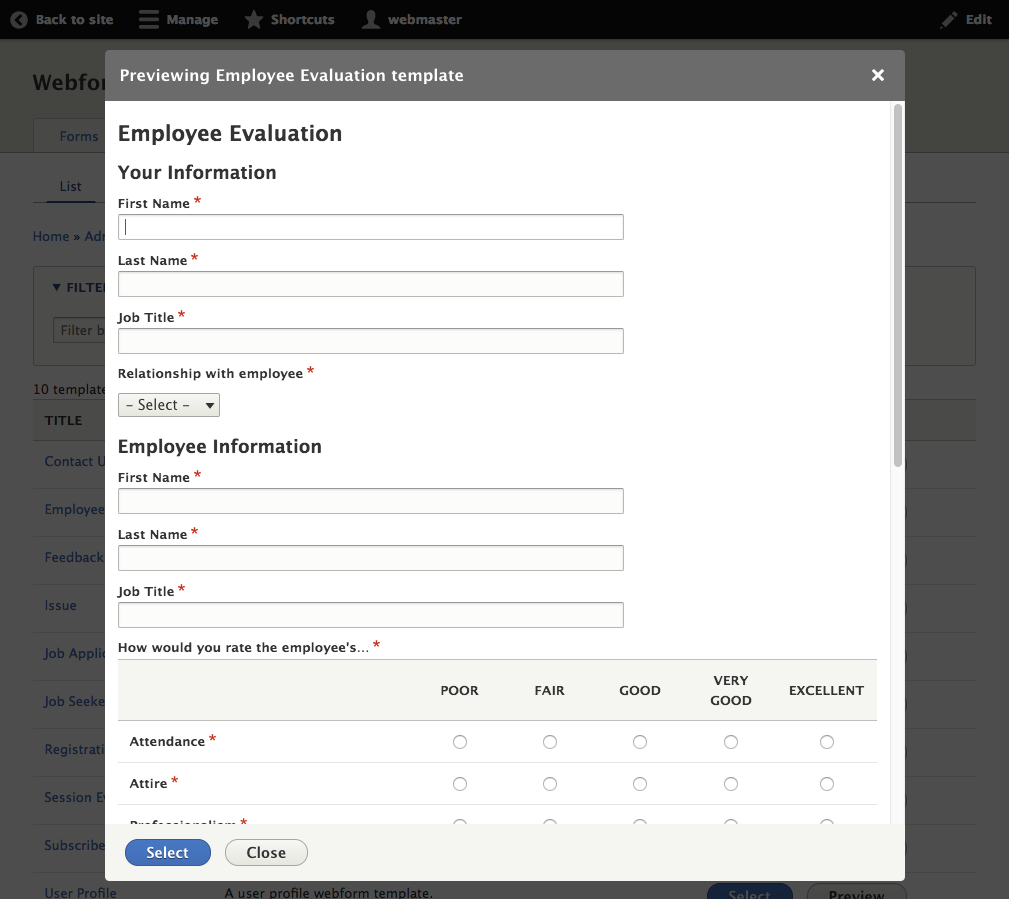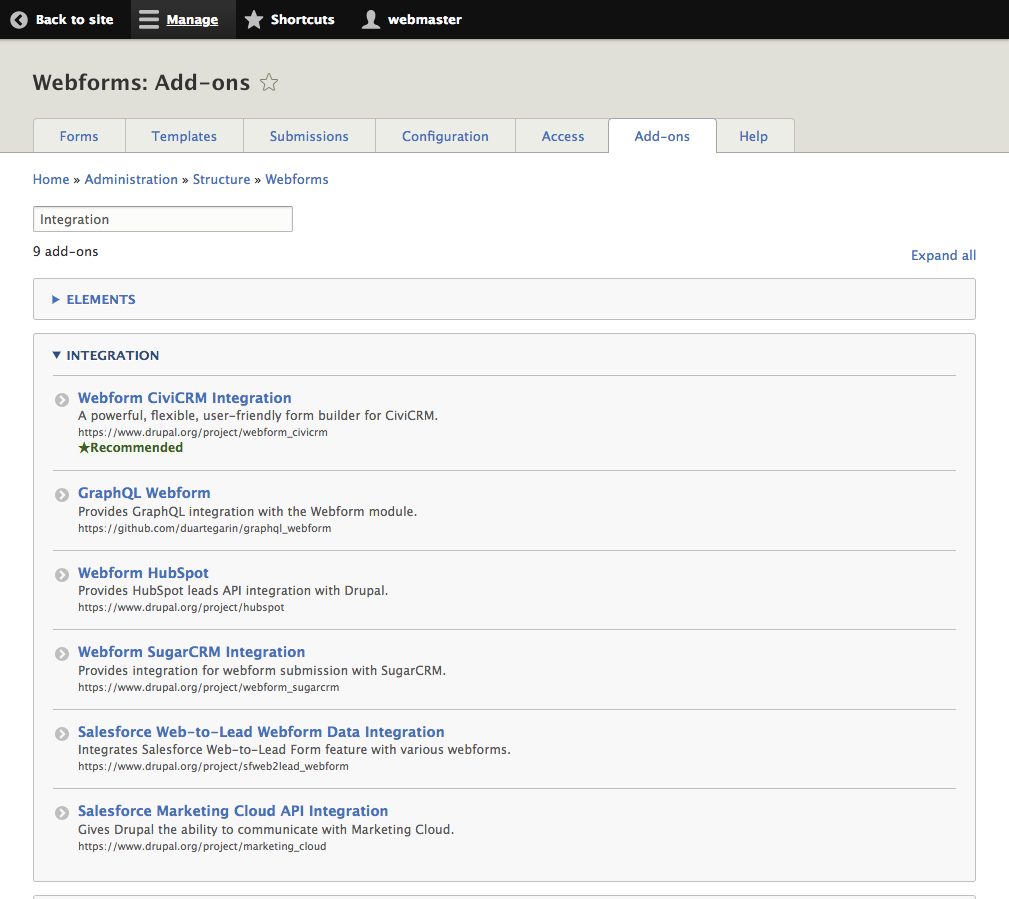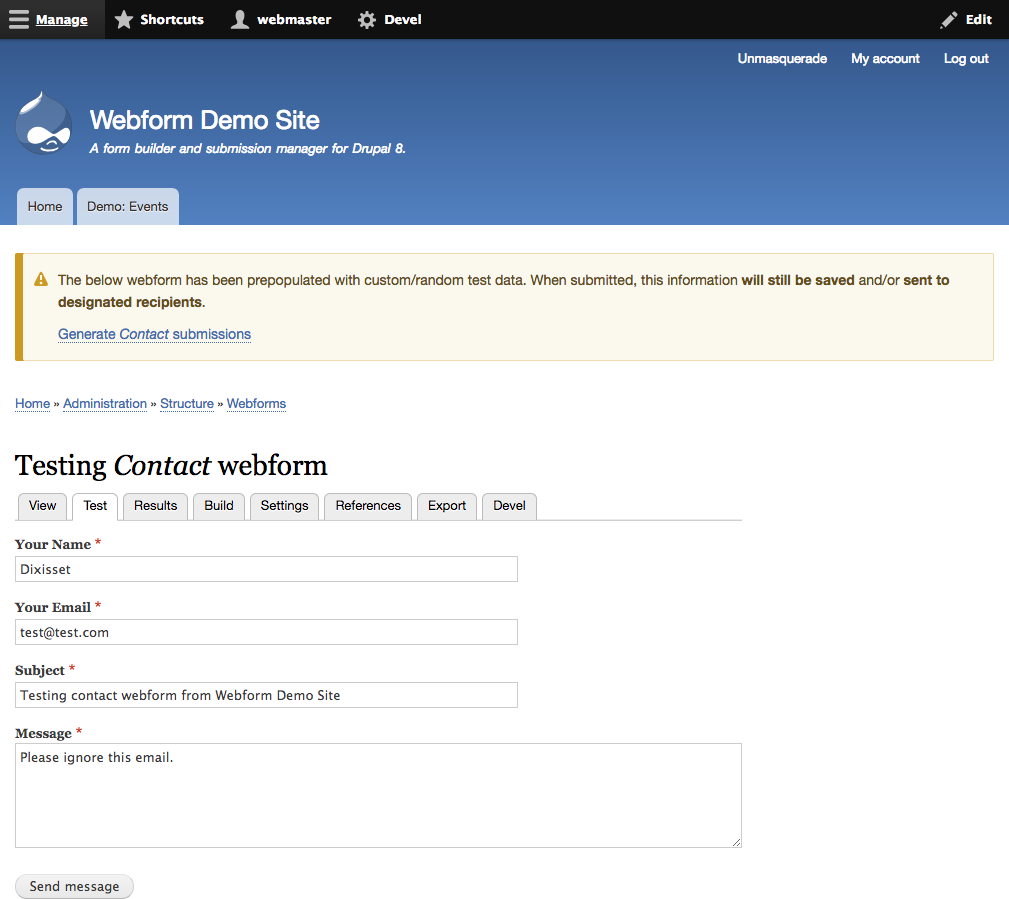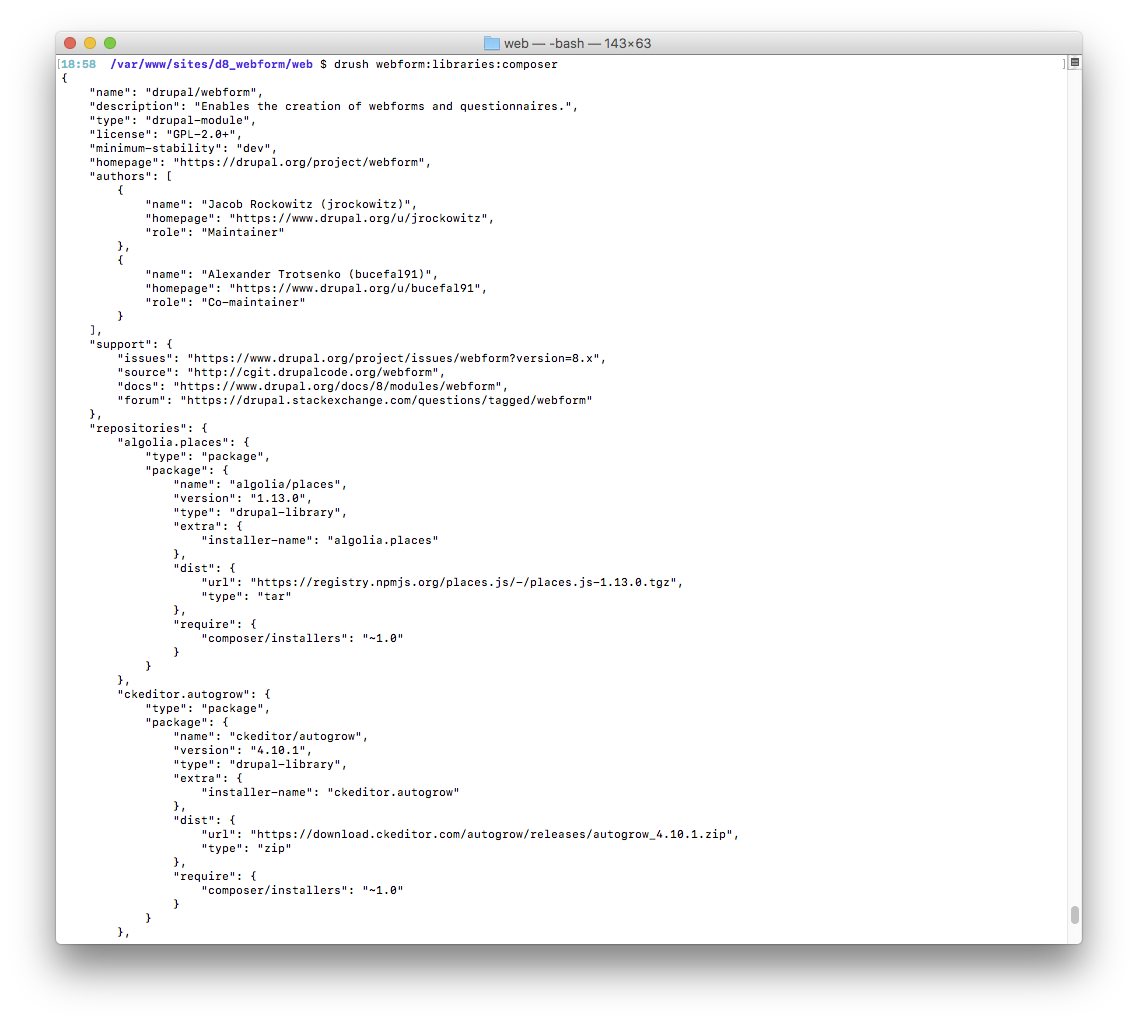23 KiB
Features
The Webform module provides all the features expected from an enterprise proprietary form builder combined with the flexibility and openness of Drupal
The Webform module allows you to build any type of form that can collect any type of data, which can be submitted to any application or system. Every single behavior and aspect of your forms and its inputs are customizable. Whether you need a multi-page form containing a multi-column input layout with conditional logic or a simple contact form that pushes data to a SalesForce/CRM, it is all possible using the Webform module for Drupal 8.
Drupal and the Webform module strives to be fully accessible to all users and site builders. Assistive technologies, including screen readers and keyboard access, are fully supported.
Besides being a feature rich form builder, the Webform module is part of the Drupal project's ecosystem and community.
The Drupal project is open source software. Anyone can download, use, work on, and share it with others. It's built on principles like collaboration, globalism, and innovation. It's distributed under the terms of the GNU General Public License (GPL). There are no licensing fees, ever. Drupal (and Webform) will always be free.
Form manager
The form manager provides a list of all available webforms.
Form manager features include:
- Filtering by keyword, category, and status
- Sorting by total number of submissions
- Archiving of old forms
Form builder
The Webform module provides an intuitive form builder based upon Drupal 8's best practices for user interface design and user experience. The form builder allows non-technical users to easily build and maintain webforms.
Form builder features include:
- Drag-n-drop form element management
- Multi-column layout management
- Conditional logic overview
- Element duplication
Configuration settings
Form behaviors, features, submission handling, messaging, and confirmations are completely customizable using global settings and/or form-specific settings.
General settings
Allow a webform's administrative information, paths, behaviors, and third-party settings to be customized.
General settings include:
- Categorization
- Customizable paths
- Disable saving of results
- Ajax support
Form settings
Allow a form's status, attributes, behaviors, labels, messages, wizard settings, and preview to be customized.
Form settings include:
- Open and close date/time scheduling
- Login redirection with custom messaging.
- Multiple step wizard forms
- Submission preview
- Input prepopulation using query string parameters.
Submissions settings
Allows a submission's labels, behaviors, limits, and draft settings to be customized.
Submission settings include:
- Saving of drafts
- Automatic purging of submissions
- Submission limits per user and/or per form
- Autofilling form using previously submitted values
Confirmation settings
Allows the form's confirmation type, message, and URL to be customized.
Confirmation types include:
- Dedicated page
- Redirect to internal or external URL
- Displaying of a custom status message
- Opening a modal dialog
Emails / Handlers
Allows additional actions and behaviors to be processed when a webform or submission is created, updated, or deleted. Handlers are used to route submitted data to external applications and send notifications & confirmations.
Email support features include:
- Previewing and resending emails
- Sending HTML emails
- File attachments (requires the Mail System and Swift Mailer module.)
- HTML and plain-text email-friendly Twig templates
- Customizable display formats for individual form elements
Remote post features include:
- Posting selected elements to a remote server
- Adding custom parameters to remote post requests
CSS/JS assets
The CSS/JS assets page allows site builders to attach custom CSS and JavaScript to a webform. Custom CSS can be used to make simple layout or design tweaks to a form. Custom JavaScript allows additional conditional logic and behaviors to be added to a form.
Access settings
Allows an administrator to determine who can administer a webform and/or create, update, delete, and purge webform submissions.
Elements
The Webform module is built directly on top of Drupal 8's Form API. Every form element available in Drupal 8 is supported by the Webform module.
Form elements include:
- Basic HTML: Textfield, Textareas, Checkboxes, Radios, Select menu, Password, and more...
- Advanced HTML5: Email, Url, Number, Telephone, Date, Number, Range, and more...
- Advanced Drupal: File uploads, Entity References, Table select, Date list, and more...
- Widgets: Likert scale, Star rating, Buttons, Geolocation, Terms of service, Select/Checkboxes/Radios with other, and more...
- Markup: Dismissible messages, Basic HTML, Advanced HTML, Details, and Fieldsets.
- Composites: Name, Address, Contact, Credit Card, and event custom composites
- Computed: Calculated values using Tokens and Twig with Ajax support.
Element settings
All of Drupal 8's default form element properties and behaviors are supported. There are also several custom webform element properties and settings available to enhance a form element's behavior.
Standard and custom properties allow for:
- Customizable error validation messages
- Conditional logic using FAPI States API
- Input masks (using jquery.inputmask)
- Select2 or Chosen replacement of select boxes
- Word and character counting for text elements
- Help tooltips (using jQuery UI Tooltip)
- More information slideouts
- Regular expression pattern validation
- Private elements, visible only to administrators
- Unique values per element
States/Conditional logic
Drupal's State API can be used by developers to provide conditional logic to hide and show form elements.
Drupal's State API supports:
- Show/Hide
- Required/Optional
- Open/Close
- Enable/Disable
Viewing source
At the heart of a Webform module's form elements is a Drupal render array, which can be edited and managed by developers. The Drupal render array gives developers complete control over a webform's elements, layout, and look-and-feel by allowing developers to make bulk updates to a webform's label, descriptions, and behaviors.
Forms
Accessibility
The outputted forms and even the Webform module's administrative interface (i.e. form builder) are accessible using keyboard navigation and screen readers. The Webform module complies with WCAG 2.0 and ATAG 2.0 guidelines.
Multistep form
Forms can be broken up into multiple pages using a progress bar. Authenticated users can save drafts and/or have their changes automatically saved as they progress through a long form.
Multistep form features include:
- Customizable progress bar
- Customizable previous and next button labels and styles
- Saving drafts between steps
Drupal integration
Webforms can be attached to nodes or displayed as blocks. Webforms can also have dedicated SEO-friendly URLs. Form elements are render arrays that can easily be altered using custom hooks and/or plugins.
Results management
Form submissions can optionally be stored in the database, reviewed, and downloaded. Submissions can also be flagged with administrative notes.
Results management features include:
- Submission flagging, locking, and notes
- Viewing submissions as HTML, plain text, and YAML
- Customizable reports
- Downloading results as a CSV to Google Sheets or MS Excel
- Saving of download preferences per form
- Drupal Views integration for advanced reporting.
Access controls
The Webform module provides full access controls and permissions for managing who can create forms, post submissions, and access a webform's results. Access controls can be applied to roles and/or specific users. The Webform access submodule allows you to even setup reusable permission groups which can be applied to multiple instances of the same webform.
Access controls allow users to:
- Create new forms
- Update forms
- Delete forms
- View submissions
- Update submissions
- Delete submissions
- View selected elements
- Update selected elements
Reusable templates
The Webform module provides a few starter templates and multiple example forms which webform administrators can update or use to create new reusable templates for their organization.
Starter templates include:
- Contact Us
- Donation
- Employee Evaluation
- Issue
- Job Application
- Job Seeker Profile
- Registration
- Session Evaluation
- Subscribe
- User Profile
Reusable options
Administrators can define reusable global options for select menus, checkboxes, and radio buttons. The Webform module includes default options for states, countries, demographics, likert answers, and more.
Reusable options include:
- Geographic: Languages, country, and states
- Date and time: Days, months, and time zones
- Demographic: Education, employment status, ethnicity, Industry, languages, marital status, relationship, size, and job titles
- Likert: Agreement, comparison, importance, quality, satisfaction, ten scale, and would you
Internationalization
Forms and configuration can be translated into multiple languages using Drupal's [configuration translation system](https://www.drupal.org/docs/8/core/modules/config-translation.
Add-ons
There are dozens of add-ons available that extend and/or provide additional functionality to the Webform module and Drupal's Form API.
Add-ons include:
- Analysis for creating graphs and charts
- CRM integration including SalesForce, HubSpot, MyEmma, SugarCRM, more…
- SPAM protection
- Advanced workflows
- Data encryption
- GDPR compliance
Development tools
Examples and tools are provided to help developers get started customizing existing features and adding new features to the Webform module.
Development tools include:
- Test forms using customizable default values
- Easy to export configuration files
- Debugging tools for all handlers
- Examples for external API integration using remotes posts or custom code
- Example modules for creating custom elements and handlers
- Demos for building event registration and application evaluation system
Drush & Composer integration
Drush commands are provided to:
- Generate multiple submissions
- Export submissions
- Purge submissions
- Download and manage third-party libraries
- Generate a composer.js file for third-party libraries
- Tidy YAML configuration files

